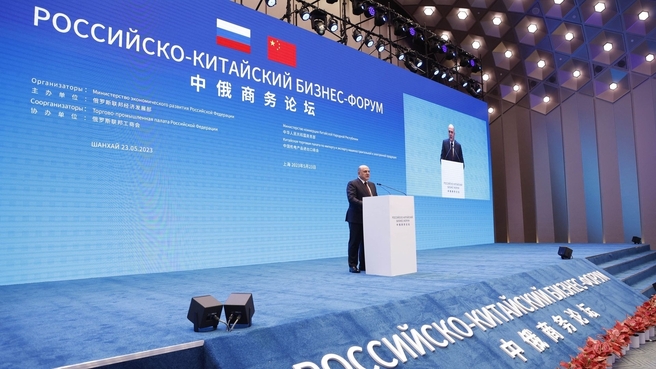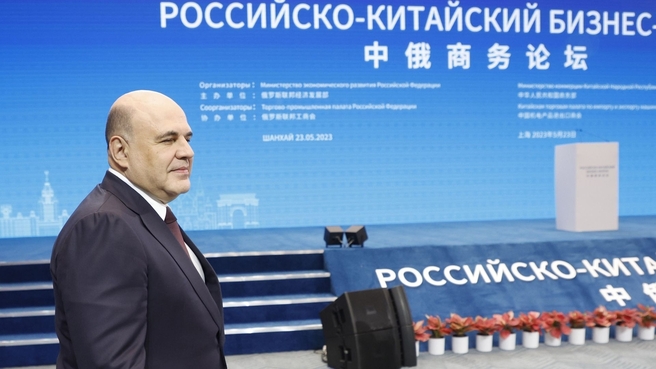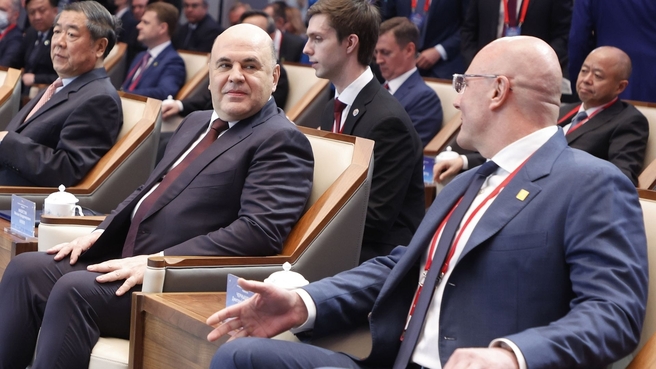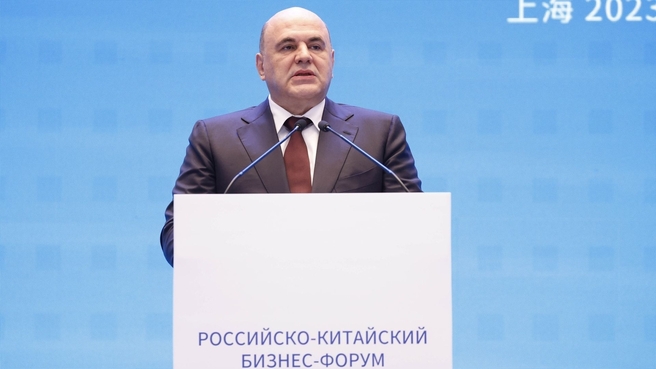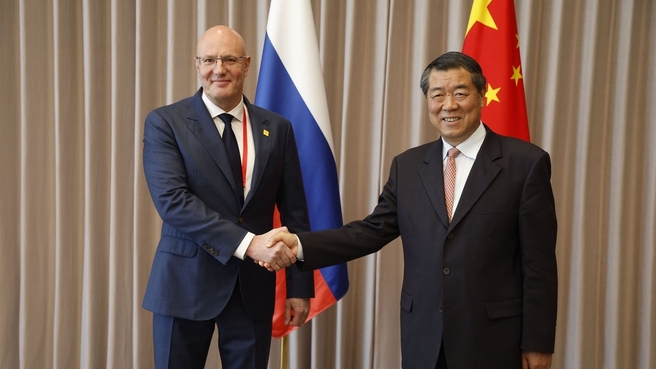The Prime Minister spoke at a forum’s plenary session.
The Russian-Chinese Business Forum is taking place as part of Mikhail Mishustin's official visit to the People's Republic of China.
The forum’s business programme includes a plenary session with the participation of the heads of the Russian and Chinese delegations and five roundtable discussions on bilateral cooperation priorities:
Russia-China transport interaction: Development scenarios.
Agricultural sector dialogue: Current challenges and modern solutions.
Prospects for Russian-Chinese cooperation in industry (in conjunction with the Russian regions’ presentation of their industrial and investment potential and business initiatives).
Energy as a driver of Russia-China cooperation.
Prospects for Russia-China dialogue in digitalisation.
The forum will be attended by over 1,300 representatives of the business circles from Russia and China, as well as representatives of several Russian regions.
Mikhail Mishustin's remarks at the plenary session:
Ladies and gentlemen,
I am delighted to welcome the participants, guests and hosts of this large forum. I would like to thank the People’s Republic of China and personally President Xi Jinping, my colleague Premier of the State Council Li Qiang, Vice Premier He Lifeng and Minister of Commerce Wang Wentao for the warm welcome accorded to the official delegation and business leaders.
As President Putin emphasised, Russian-Chinese relations have a special nature. Our peoples are bound by ties of neighbourliness, mutual assistance, support and friendship.
The heads of a number of government agencies and regions, as well as top executives from many major companies have come here from Russia with me. All of them are open to dialogue, to developing bilateral contacts in their respective areas and expanding areas for cooperation.
I am positive that the business forum will provide an opportunity to get to know each other better and to find new reliable partners. This will contribute to productive work and the strengthening of ties between Russian and Chinese businesses, and to launching a large number of promising projects in a variety of fields.
The wonderful feeling here is inspiring. We are now in Shanghai, one of the most powerful and dynamic metropolitan areas in China and the entire Asia-Pacific region.
Last year, Russia was subjected to unprecedented sanctions pressure seeking to break our economy, collapse the national currency, set off devastating inflation and attack the standard of living of ordinary people.
None of what our detractors dreamed of, happened. We have not only survived, but continue to move forward.
I’m sure that deeper Russian-Chinese cooperation and expanded collaboration will have a positive impact on strengthening our countries’ economies as well.
The unemployment rate in Russia is at an all-time low of 3.5 percent. As of early May, inflation slowed to 2.3 percent in annual numbers which is the lowest figure in Europe.
Financing institutions, currency and the stock markets are functioning as usual thanks to the existing national payment and settlement infrastructure.
In terms of a number of economic parameters, we have seen significant growth rather than a drawdown. Thus, last year we reached a new all-time high in the grain harvest at 157 million tonnes, thus significantly surpassing even the numbers achieved in the Soviet Union. Now Russia fully meets domestic demand for grain, sugar, vegetable oil, meat, and fish and then some.
Acting on the instructions issued by the President of Russia, wide-scale programmes are being implemented in order to upgrade infrastructure, including public utilities, in the regions. Significant federal funding has been allocated for these purposes.
We are making serious efforts to facilitate business activities. In particular, we lowered corporate revenue tax rates in a number of industries. We continue to simplify customs clearance procedures and to alleviate the administrative burden. More than 2.5 million permits have been renewed automatically. The public services portal can now be used to obtain over 200 different licenses.
Our country is oriented towards dynamically developing markets. We have expanded trade contacts with the fast-growing economies. These words fully apply to our great friend, China.
Russia's foreign trade grew by over 8 percent last year to $850 billion with exports up almost 20 percent.
We will continue to build up ties with friendly countries. This is one of the six key tasks that President Putin identified for this year.
Russia values the long history of its relations with China.
Over the past two years, mutual trade volumes have grown by approximately 33 percent. In 2022, we set a new record, about $190 billion. I am confident that in 2023 we will accomplish the objective that was set by the leaders of our states, Vladimir Putin and Xi Jinping, to expand mutual trade to $200 billion. It has increased by almost 25 percent in the first quarter and reached about $52 billion.
Mr He Lifeng, you have noted that for over 10 years China has been Russia’s main trade partner. In the first three months of 2023 our position has also changed on China’s list; Russia has risen from tenth to seventh in trade.
This growth goes hand in hand with important qualitative transformations, including, first and foremost, our reduced dependence on the dollar and other Western currencies. In 2021, national currency transactions accounted for 25 percent of Russian-Chinese mutual settlements, in 2022 they reached over 66 percent.
We will continue to increase the independence of our bilateral financial interaction and strengthen our economic sovereignty. The March 2023 Russian-Chinese summit was an important event that held the attention of the world. The talks at the Kremlin provided impetus for building an equitable multipolar system of international relations.
The leaders of our countries, Vladimir Putin and Xi Jinping, made joint statements that determined the strategic priorities for mid-term interaction. They set goals to boost bilateral trade volumes, improve logistics connectivity, raise the level of financial and industrial cooperation, strengthen our energy partnership, and expand technological cooperation including in the field of innovation. These guidelines will make it possible to find growth points for Russian and Chinese businesses. This is a clear message to the business community.
Colleagues, you have good opportunities for displaying your initiative, enterprising spirit and organisational abilities. Russia is ready to provide practical support to the representatives of business circles who respond to this call.
Today, our investment portfolio has about 80 major projects with a total investment volume of over 165 billion dollars.
Industrial and technological cooperation has special significance. Today, it is important that we pool resources and skills for creating competitive and affordable goods for our industries and consumers. We will be able to achieve much greater successes in this area if we work proactively together.
Today’s conditions are providing opportunities for expanding the presence of Chinese companies in Russia and for opening production facilities in China, including those in free economic and special industrial zones. They offer extensive logistics infrastructure and a wide range of preferential regimes.
In addition to setting up industrial production facilities and enterprises for the deep processing of raw materials, our cooperation can also include the provision of mutual access to advanced technology, the promotion of promising innovation solutions and, of course, the harmonisation of national standards and technical requirements. We have a good track record of working on joint initiatives in a number of knowledge-intensive industries, such as civil aviation and the automotive industry. Mechanical engineering for the fuel and energy industries offers significant potential. Here we can talk about using advanced technology to develop and manufacture oil refining and petrochemical equipment, as well as equipment for the production, transport and storage of liquefied natural gas. Other promising areas of cooperation include shipbuilding and the machine tool industry, the production of civil unmanned aerial systems, as well as the lumber industry.
When implementing high-tech projects, the Russian Government is willing to provide businesses from the two countries comprehensive support. We give unconditional priority to partnerships in the energy sector. Our country ranks first in terms of oil supplies to China. Exports of natural and liquefied gas and coal are growing steadily as well. Nuclear energy including new Russian-designed reactors is another strategic area of common interest. Importantly, the relevant agreements are being implemented as scheduled. We are ready to participate in the joint implementation of other major projects, including renewable energy sources. Of course, we will continue to supply hydrocarbon resources on a long-term and mutually beneficial basis. The Russian-Chinese Energy Business Forum is instrumental in promoting direct contacts and projects. The fifth meeting will be held this year and devoted to new forms of cooperation. Our agricultural industries are another area of cooperation. You covered this in detail, esteemed Mr He Lifeng. Bilateral trade in agricultural products is picking up steam. Last year, it grew by 42 percent to over $7 billion. As of the first quarter, growth was already over 90 percent to almost $2.5 billion. I am convinced that this is the beginning of a long journey. Russian agrarian business people are ready to significantly increase their exports to the Chinese market and to expand the range of supplied products of both plant and animal origin. It is necessary to do more to facilitate mutual access to agricultural markets and jointly strengthen food security.
In these new geopolitical circumstances, cooperation in the field of transport is of particular importance.
As of the first four months of 2023, the dynamics of freight transport as well as passenger traffic between Russia and China have increased markedly. We are interested in the further eastward development of the international Russia Corridor with branches to the PRC, including through Kazakhstan and Mongolia, which is necessary to ensure seamless supply chains from St Petersburg to Vladivostok and to boost trade. Russia and China share a long land border and the infrastructure needs to be upgraded. To do this, it is important to continue to work on both sides to increase the capacity of transport arteries and to modernise checkpoints. The expansion of air traffic and wider use of the potential of the Northern Sea Route as the shortest route from Asia to Europe are among the other priorities. ICT cooperation is at a high level. A number of bilateral projects, which focus on introducing digital solutions in various areas of life, are underway. Also, the potential is good for promoting cooperation in open-source software, mobile operating systems, data centres, and information security.
Another important area of cooperation is digital technologies in education, which significantly increases the accessibility of education and new competences. But, of course, this cannot replace the traditional formats of study completely. Russian universities have great experience in this area and are ready to share their best practices and techniques. They invite students from China to take part in their higher education and professional retraining programmes.
Special attention should be paid to the development of bilateral relations in high-tech sports, especially given that 2022 and 2023 were declared the Years of Russian-Chinese Cooperation in Physical Fitness and Sports.
At a meeting with Chinese President Xi Jinping in March, President of the Russian Federation Vladimir Putin invited our Chinese friends to take part in the Games of the Future international tournament to be held next spring in Kazan. It will bring together traditional and innovative sports that use the technologies of virtual and augmented reality on one platform. We expect Chinese teams to attend the pilot competitions this year and the main tournament in 2024.
I suggest we coordinate our work as regards the participation of Chinese athletes in the games and in the integration of IT companies. We hope that in a year’s time, China will host this major multi-sport event.
Of course, we also value the cooperation Russia and China enjoy in the humanitarian and cultural spheres. We have major projects in higher education. We expand student and teacher exchanges and hold joint research, both fundamental and applied. We are also expanding our ties in culture, classical music, theatre and filmmaking. These are priority areas; they are important for developing contacts between people and strengthening the solid foundation of Russian-Chinese friendship.
Ladies and gentlemen!
Today, big opportunities are opening up in Russia for almost any type of business. We welcome partners from friendly countries, first of all China, to launch promising, long-term projects in many sectors of the economy.
Of course, our country is facing a number of important tasks, including those related to the building of new logistics systems and providing for the country's financial and technological independence. We are already developing this work on a system-wide basis. So there is no doubt that all of the goals will be achieved.
I want to emphasise that, here and now, the foundation of our joint future successes is being laid.
I am sincerely confident in this. As a poet of the Tang dynasty wrote, if you want to see things thousands of li away, take one step up. I suggest we take this step together to strengthen the comprehensive partnership and strategic interaction between Russia and China even more to the benefit of our countries and peoples.
Dear friends,
I also want to invite you to one of the world’s major and most important business events, the St Petersburg International Economic Forum. This year, it will open on 14 June.
And in July, we expect to see you in Yekaterinburg at the Innoprom industrial expo, and the 7th Russia-China EXPO that will be held as part of Innoprom.
